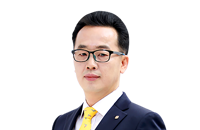데이비드 김 노스헤드캐피털파트너스 대표는 투자 전문가이자 인터뷰 고수로도 유명합니다. 전 세계 굵직굵직한 '큰 손'과 투자전문가를 찾아 인터뷰를 진행하고 팟캐스트 채널 'CEO 라운드테이블-브릿징 아시아'와 '아시안 인베스터스'에 게재해오고 있습니다.
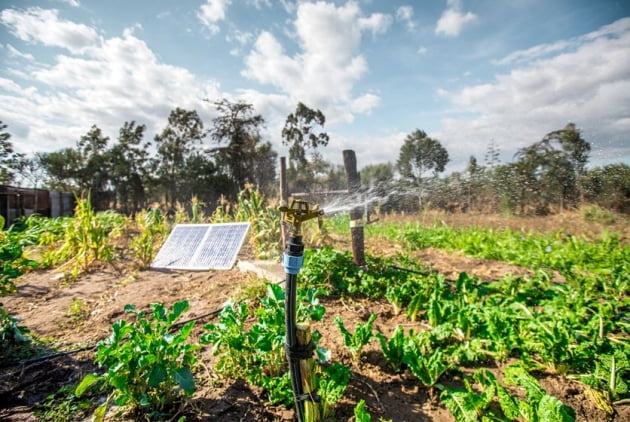
아프리카 케냐에 기반을 둔 스타트업 선컬처(SunCulture)는 소규모 농부들을 위한 관개(灌漑·농경지에 물을 인위적으로 공급하는 행위) 장비를 공급하고 있다. 이 회사가 만드는 장비들엔 태양광 패널이 부착돼 있다. 농업 용수를 끌어오는 펌프가 태양 에너지로 움직이는 방식이다. 물과 전기가 모두 부족한 아프리카 지역 농부들에게 합리적인 가격의 재생 에너지를 공급해 생산성과 소득을 향상시키고, 온실가스 배출을 줄이는 '일거양득'의 효과를 낳고 있다는 평가다.
선컬처는 블룸버그 뉴 에너지 파이낸스로부터 '뉴 에너지 파이오니어'로 선정됐다. 또 런던 증권거래소의 '아프리카에 영감을 주는 기업들(Companies to Inspire Africa)' 리스트에 등재되기도 했다.
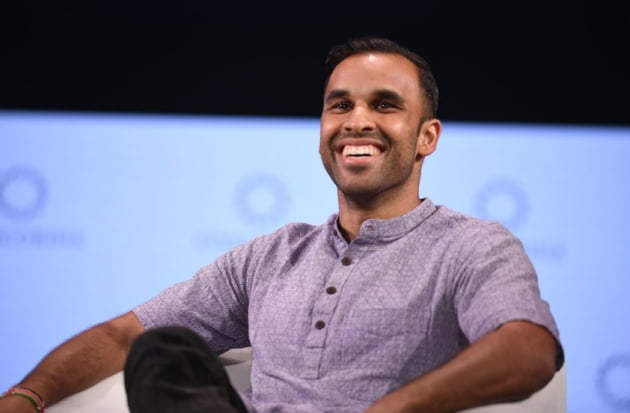
이 회사 공동 창업자 겸 최고경영책임자(CEO)인 사미르 이브라힘(Samir Ibrahim·사진)은 뉴욕대 스턴 스쿨을 나온 재무·국제경영 전문가다. 창업 전엔 글로벌 컨설팅 그룹인 PwC에 몸담은 바 있다.
다음은 그와의 일문일답.
반갑다. 소개를 부탁한다.
"0609 16.31 S, 3911 34.08 E. 내 왼쪽 팔뚝에 새겨진 문신이다. 탄자니아 잔지바르 항구의 좌표다. 1850년, 나의 현조부께서 무역업자로서 아프리카에 처음 발을 디뎠다. 우리 조상들은 더 나은 삶을 찾아 인도에서 빠져나왔다. 동아프리카와 중앙아프리카에서 몇 세대 동안 그들은 이디 아민(우간다의 폭군 대통령) 시대의 불안감을 피해 도망을 다니곤 했다. 그들은 캐나다로 이민을 갔고, 우리 부모님은 토론토에서 인연을 맺었다. 우리 가족은 세탁소를 운영하기 위해 플로리다로 이사했다. '기업가 정신'과 '희생'이라는 두 가지 키워드를 안고 자라면서, 아프리카 대륙에서 큰 문제를 해결코자 하는 다짐이 굳어졌다."
어떻게 사업 아이디어를 내게 됐나.
"뉴욕대 스턴 스쿨에 입학했을 때부터 '10년 계획'을 갖고 있었다. 내 10년 계획은 동아프리카 지역에 도로, 다리, 항구와 같은 인프라를 건설하는 프로젝트였다. 나는 아프리카 신흥 시장이 내가 평생을 바칠 곳이라는 것을 깨닫고 있었다. 우리 부모님은 항상 내가 남들보다 더 많은 기회를 갖고 있고, 그 기회를 이용해 남을 돕는 것의 가치를 보여주는 분들이었다.
하지만 내 10년 계획은 전 세계 소규모 농부들이 직면한 도전들을 해결해주지 못했다. 그들은 굉장히 많았지만 나는 그들을 이해해주지 못했다. 다행히 공동 창업자인 찰리가 이런 도전에 대해 알고 있었고, 우리는 같이 이 문제를 탐구하기 시작했다. 복합적인 식량 불안이 어떻게 세계적인 빈곤과 연결되고, 또 어떻게 기후 변화와 연결되는지를 연구했다. 거시적 문제들이 중심에 자리잡고 있었다. 그냥 무시하기에는 너무 큰 문제였다. 그 사실을 깨달았을 때, 머리를 얻어맞은 기분이었다. 그 길로 뉴욕대 스턴 스쿨에서 열린 스타트업 피칭 대회에 참가해 2등을 차지했고, 짐을 싸서 꿈을 현실로 만들었다."
지금 해결하고자 하는 문제는 무엇인가.
"우리는 스스로를 단순히 태양광을 이용한 관개 장비 회사가 아니라고 생각한다. 우리는 식량 불안과 세계 빈곤, 기후 변화의 연결고리에 있는 '문제 해결사'다. 소규모 농부들은 우리들이 매일 먹는 식량의 대부분을 재배하고, 기후 변화에 가장 '덜' 기여한다. 그럼에도 그들은 기후 변화로 가장 큰 고통을 받고 있다. 그들은 세상을 지탱하고 있는 사람들이다.
2050년까지 전 세계를 먹여살리기 위해 식량 생산이 두 배로 늘어야 한다는 통계를 들어봤을 것이다. 소규모 농부들이 식량 생산에 핵심적인 기여를 할 것이다. 하지만 기후가 변하면서 타격을 받고 있다. 비가 오기를 기다리면서 식량을 재배하지만, 이제 그들은 훨씬 더 예측할 수 없고 신뢰할 수 없는 삶을 살아야만 한다. 우리 모두가 직면할 이 거시적 문제를 해결하기 위해서는 이들에게 힘을 실어줄 방법을 찾아야 한다."
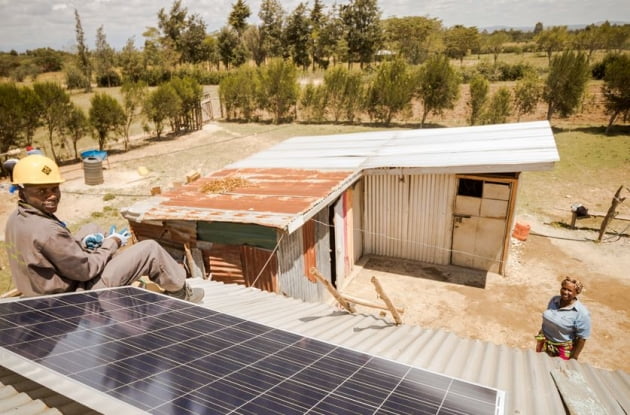
사업모델은 무엇인가. 또 다른 회사와의 차별점을 꼽는다면.
"대표 제품은 날씨에 관계없이 고부가 작물을 재배할 수 있도록 하는 'RainMaker2 with ClimateSmart Battery'다. 이는 PAYG(Pay As You Grow, 사용한 만큼 지불하는 방식) 형태로 판매된다. 우리는 고객들의 농업 현장에 설치팀은 물론 전담 A/S팀과 A/S센터도 운영한다. 영세 농민들이 저렴한 가격에 제품을 이용하려면 우리가 연구개발(R&D)부터 판매, 사후관리, 자금조달에 이르기까지 모든 가치사슬을 마스터해야 했다.
우리 회사의 차별점은 '최초'라는 점이다. 아프리카에서 태양광 관개를 상용화한 기업은 우리가 처음이다. 우리 제품은 케냐와 우간다, 잠비아, 에티오피아, 세네갈, 토고, 코트디부아르의 농부들에게 전달된다. 또 농민들은 우리의 PAYG 옵션을 이용해 합리적인 가격에 시스템을 이용할 수 있다."
선컬처의 제품을 사용할 때 얻는 장점은 무엇인가.
"우물 바닥에서 20㎏짜리 물통을 끌어다가 집으로 간다고 상상해 보라. 그리고 매일 2~3시간 동안 이 행위를 반복해야 한다고 생각해 보라. 이렇게 힘든 일을 마치고 나면 정작 요리하고 마시고 씻을 물이 남지 않게 된다. 농민들의 밭은 더위에 시들어가고 있지만 그들은 비가 오기를 기도할 뿐이다.
오늘날 아프리카의 96%에 달하는 영세 농민들이 겪고 있는 현실이다. 하지만 선컬처의 제품을 통해 현실을 바꿀 수 있다. 꾸준한 물 공급으로 농부들은 수확량을 늘리고, 더 가치가 높은 작물을 재배하고, 경작지를 확장하고, 더 많은 가축을 기르고, 가축으로부터 더 많은 우유를 얻을 수 있다. 우리 고객들은 소득을 5배에서 10배까지 늘릴 수 있고, 그들의 가족과 미래에 투자할 여력이 생기게 된다."
회사 인력은 어떻게 채용하나.
"일단 최고의 인재를 뽑기 시작하면 고용이 훨씬 쉬워진다. '진짜는 진짜를 알아본다'는 말이 있지 않나. 우리는 가장 똑똑하고, 밝고, 회복력 있는 사람들을 뽑아뒀기 때문에 비슷한 특성을 가진 사람들이 우리 회사에 끌린다는 것을 깨달았다. 그래서 채용이 쉬워졌다."
회사가 내고 있는 성과는 무엇인가.
"선컬처는 이미 수만 대의 제품을 판매했다. 최근 일부 시장조사업체가 실시한 보고서에 따르면 우리 제품을 이용하는 농가의 약 95%가 삶의 질이 상승했다. 또 85%는 향후 한달 동안의 농업 활동에 자신감을 내비쳤다. 87%는 생산성이 증가했다고 보고했고, 81%는 땅을 추가로 경작하지 않고도 생산성을 증가시켰다고 했다. 이에 따라 농민의 80%가 수입이 증가했고, 분기별로 평균 44%의 수입 증가율을 기록했다."
지금까지 스타트업을 운영하면서 겪은 가장 큰 시행착오는 무엇이었나.
"우리는 그동안 너무 많은 실수를 했고, 계속해서 실수를 하고 있다. 경영과 리더십이 제일 어렵다. 리더로서의 내 역할을 이해하지 못하고, 최고의 인재들을 어떻게 관리해야 하는지 몰랐던 점이 후회된다. 하지만 돌이켜보면 내 실수에 대해 마음을 열고 솔직하게 대처하고 사과한 것이 결국 전화위복이 된 것 같다."
선컬처의 장기적 비전은 무엇인가.
"우리는 단순히 케냐나 아프리카인들만을 위한 회사가 아니다. 보람있고 지속가능한 방법으로 환경을 통제하는 세상을 건설하는 게 비전이다. 세계 5억7000만 소규모 농부들의 가장 큰 일상적 과제를 해결하는 기술을 개발하고 사업화해 나가고 있다."
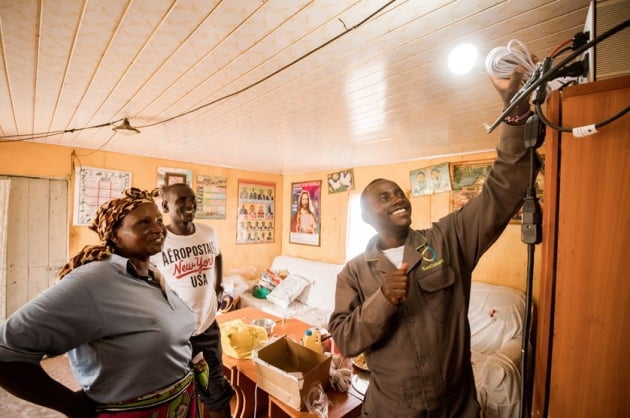
아래는 영어 인터뷰 전문
1. Can you tell us about your background and your journey to SunCulture?
0609 16.31 S, 3911 34.08 E. Tattooed on my left forearm are the coordinates of the Port of Zanzibar, where my great-great-great grandfather first set foot in Africa in 1850 as a trader. Both sides of my family set sail from India in search of a better life. After generations in East and Central Africa, they found themselves on the run from prejudice and instability in the Idi Amin years. They immigrated to Canada and my parents met as new immigrants in Toronto, fell in love, then moved our little family to Florida to run a dry cleaner’s. Growing up surrounded by the twin narratives of entrepreneurship and sacrifice cemented my drive to use my talents and opportunities to solve Big Problems, particularly on the African continent.
2. How did you come up with the business idea in the beginning? Why Africa?
When I went to undergraduate business school at NYU’s Stern School of Business, they taught us how to forecast, and I had this ten-year plan. My ten-year plan ended with me in East Africa doing infrastructure projects. So roads, bridges, ports, that kind of stuff. I knew that this part of the world and broadly emerging markets was something that I was going to spend my life, places I’ll spend my life in and engage with. That also goes back to growing up as a child of immigrants. My parents always reminded me that I had more opportunities than them, and they always showed me the value of using those opportunities to help others.
So, community service and volunteerism were really big in my family and my community. My ten-year plan had that in the mix, but I didn’t understand the challenges that small farmers faced around the world, I’d never lived those challenges myself. My co-founder Charlie was reading about these challenges and brought them to my attention and we started exploring them. The numbers are just too big to ignore. You’re talking about the combination of food insecurity; you’re talking about how that intersects with global poverty and how that intersects with climate change. All of the numbers that people talk about, those sit in the center of all of these really big macro problems. It was just too big of a problem to ignore. When I learned about it, it just hit me in the head. The idea that would become SunCulture was born when we entered the nascent concept in a pitch competition at NYU Stern, got second place, and packed our bags to turn our vision into a reality.
3. What problems are you solving now?
We don’t see ourselves as simply a solar irrigation company, we see ourselves as problem-solvers at the nexus of food insecurity, global poverty, and climate change. The thing with agriculture, these small farmers grow most of the food that we eat on a daily basis and contribute the least amount to climate change. And yet, they suffer the most from it. These are the folks that are supporting the world. You hear statistics about the need to double food production by 2050 in order to feed the world, and smallholder farmers are going to be a large part of that. They’re the ones that are getting hammered by climate change right now. They grow food by waiting for the rain. With the changing climate, the rain is becoming even more unpredictable and even more unreliable. In order to start solving these very macro problems that we’re all going to face like food shortages, we need to figure out how to empower the smallfarmer to grow the food that we need when we need it.
4. How does your business model work? What sets SunCulture apart from others in the markets?
Business Model:
SunCulture has invested 8 years focusing on in-field R&D testing to understand the smallholder farmers’ needs and design its products accordingly. It has an impressive product innovation track record. Our flagship product is the RainMaker2 with ClimateSmart Battery, a solar-powered water pumping and irrigation system that allows farmers to transition from dependence on low-value, rain-fed crops that they can harvest only when the weather cooperates, to farming high-value crops year round. We conduct R&D with our in-house team, then send our products off to be manufactured (mostly in China). Sales take place through diversified channels; we conduct marketing through digital and in person platforms. Customers who are interested in PAYG are assessed by our credit team for approval. Once the finances are in order, we dispatch the solar water pump system and send a field engineer to perform the installation. We have a dedicated after-sales team to address any customer concerns, as well as after-sales centres where customers can walk in for concerns or spare parts.
Delivering a solar water pump and energy management system at a price affordable to smallholder farmers has required SunCulture to master the entirety of the small-scale agriculture value chain, from R&D, to sales, to after-sales, to financing. Our business model includes both B2C sales (primarily in Kenya) and B2B sales through distribution partners internationally.
What sets us apart from others:
SunCulture is the first company to commercialize solar-powered irrigation in Africa. SunCulture products now reach farmers in Kenya, Uganda, Zambia, Ethiopia, Senegal, Togo, and the Ivory Coast. We’re the only company that combines top-of-the-line technology with affordable financing models and value-added services, including power for the home. We’re the largest distributor of solar water pumps for farmers in sub-Saharan Africa, and the only company in the region that has technology that’s powerful enough to power appliances for both the farm and the home at the same time. Farmers can finance our systems using our Pay-As-You-Grow financing option, and over time, our farmers see increases to their income by 5-10 times.
5. How does that equipment look like?
Our flagship product is the ClimateSmart with RainMaker2, which is a solar-powered water pumping and irrigation system that allows farmers to transition from depending on low-value rain-fed crops that they harvest only when the weather cooperates, to farming high-value crops year round. And over time, our farmers have seen increases to their incomes of 5-10 times while upgrading their home to enjoy modern appliances like lighting, phone charging, and TVs. Our systems include battery storage, so our clients can use these features day or night. In terms of financing, we offer a Pay-As-You-Grow plan that lets farmers pay a small monthly installment over several months, and we provide everything from installation to training to after sales support.
6. What are the economics of farming when using Sunculture’s pump vs. without?
Imagine hauling a 20 kg bucket of water from the bottom of a well, then lugging it home. Imagine doing this for 2-3 hours each day. At the end of that backbreaking work, you barely have enough water for cooking, drinking, and washing. Your fields are shriveling in the heat, but you can only pray for the rain to come to grow the crops that will feed your family and sustain your livelihood.
This is the reality for 96% of smallholder farmers in Africa today, who depend on rain-fed agriculture. With SunCulture's solar-powered water pumps and irrigation systems, the story changes. With a steady supply of water, farmers can increase yields, grow higher-value crops, expand land under cultivation, raise more livestock, and get more milk from their livestock. All told, our customers can multiply their incomes by 5X to 10X, which they can invest in their farms and families’ futures.
It’s a groundbreaking virtuous cycle that equips farmers to change their lives and the world.
7. How do you find and hire smart people?
Having the best people for the types of role you are hiring for is the most important thing of any business, especially for a business like ours where we are the first to do something. I find that starting by hiring the best people allows you to continue to hire the best people. There’s a saying that goes “Real recognizes real”. We find that by having the smartest, brightest, and most resilient people in our team, other people with similar characteristics are drawn to us, and that makes hiring much easier.
8. Tell us about your fundraising. How many outside investors did you pitch for your 1st fundraising? How did it go? Were they all fascinated by your business plan and fundraising pitch? How did you deal with that tough job?
The first time we raised equity was such a journey. We pitched to over 150 investors and we got down to the final one. We were about to get the money wired, but then the government where that investor lived changed regulations that hurt his business and he had to pull out of the deal. And then we went through the process again.
Throughout all our fundraising experiences, I find that people are really fascinated by our business. The difference between when we first started fundraising and now is that when we first started fundraising, we had to convince people that this was a good idea. We had to convince people that this would work. Everyone was fascinated by the idea, but no one had done what we were doing so it was hard for people to believe that we would be able to execute on it. Now it’s much easier. We have a track record, people have seen it working for a few years, and it’s much easier to fundraise.
I deal with the often tough job of fundraising by making sure that I have a close group of friends and peers that have or are going through the same process with whom I can chat, and by making sure that the team we have at SunCulture can support me by either taking some responsibilities off my plate or being there to support different parts of the fundraise. It makes it much easier to raise money that way.
9. Tell me about how the company has grown for the past 9 year and how it is performing now, in terms of milestones, annual sales, number of clients, or market coverage/expansion, etc.
SunCulture has sold tens of thousands of units of solar water pumps.. Based on GOGLA’s Global Off-Grid Solar Market Report, SunCulture is Africa’s market leader in solar irrigation for smallholder farmers. In a recent impact report conducted by 60 Decibels, 95% of surveyed SunCulture farmers reported improvements in their quality of life. In addition, 85% of SunCulture’s farmers are confident about their farming activities over the next month, compared to just 37% of Kenyan farmers overall. 87% reported an increase in agriculture production and 81% of those did so without planting additional land. This resulted in 80% of the farmers having an increase in money earned and an average revenue increase of 44% per season.
10. In order to take the business to the next level, what is the biggest challenge in running a startup in Kenya/Africa?
One of the hardest parts about running a business in the markets that we work in (Sub-saharan Africa) especially as it relates to taking the business to the next level, is that there is a lot of coordination required. You have to coordinate funders, supply chain, hiring the best people ?- all in a resource-constrained environment. You have to do a lot of things at the same time and do a million things really well.
I think another thing that’s challenging is that the world is built to reward short-term incentives, and the work that we're doing helps create long-term resilience for humanity. The return profile of the business that we run and operate looks different from some other businesses that have shorter term returns. The challenge comes with how you align investors to understand that investing in businesses like SunCulture are incredibly profitable and will give them incredible returns but in a different time period than they may be used to investing. This is particularly the case when coordinating capital from more mature venture markets like Europe and America and making sure that investors have the understanding of what our business is and how we can help them.
11. What have been the biggest mistakes (trial and errors) while running the startups so far, how did you deal with that situation? And what did you learn from that?
We’ve made so many mistakes along the way and we continue to make mistakes. I think the number of mistakes we’re making is getting less in numbers and in severity. Personally, some of the biggest mistakes I’ve made have been on management and leadership, specifically on not understanding my role as a leader and not understanding how to best manage top talent.
I’ve been very lucky to have a number of mentors and coaches that have helped me with this. But I think that if I looked back, the way that I dealt with it was just by being open and honest about the mistakes, talking to the people that I’ve made the mistakes with, working with them to fix it, and working with people who have gone through it before to make sure that I am serving the folks that work with us in the best way possible.
12. What is your long term vision for SunCulture?
Our vision for SunCulture has never been one for just Kenya, or even just Africa. SunCulture’s vision is to build a world where people take control of their environment in rewarding and sustainable ways, and we do this by developing and commercializing life-changing technologies that solve the biggest daily challenges for the world’s 570M smallholder farming households.
13. What drives you in business to push beyond what other people consider normal?
The more I go through this journey, the more clarity I get on what pushes me to go beyond what others may consider to be normal. One, the world is on fire. We are in a climate crisis, and if we don’t fix the way we operate on this planet, we are in deep, deep trouble as a society. I believe that the work we’re doing at SunCulture is fundamental to us combating the climate crisis. If we don’t do this, we will be in a much worse off position than we are now or that we will be in the future.
Second, which is related, is that we need to prove that investing in climate assets that produce long-term returns, but may not have the return profiles that many venture investors are used to, is so important. We need to figure out how to change the way people invest. We need to incentivize people to take their money out of the financial systems and into productive companies and high-value assets that are creating a better world for today and in the future.
Once SunCulture is successful and we are able to absorb hundreds of millions and billions of dollars and allocate it officially and effectively, we then show commercial inventors that businesses like SunCulture that operate in emerging markets that are considered to be “hard” are good investments. We need to shift the way capital flows around the world. That drives me to continue to build.
14. If you had your time again, what would you do differently?
I think about this question a lot and I think about this in two ways. If I launch a business again, there are many things that I will do differently but I only know that because of the way I used my time getting here. So in that, I wouldn’t use my time much differently. Sometimes I think if we had started lending earlier, we would have been further than we are today. But then I remind myself that we started lending when we had a product that was at a price point at which we can lend so it’s really tough to see if there’s something we could do differently.
I think I would have reminded myself to enjoy the process a bit better. Sometimes I feel like I’ve gotten caught up in the urgency and the stress of the situation versus enjoying the process but I feel like that’s probably natural. Also, the process that I need to go through in order to be where I am today or in a place where I can enjoy a bit more.
15. How do you unwind?
I exercise, read, hang out with my partner, talk to my family, and have dinner with my friends. I love dancing, so I go dancing too.
<i>데이비드 김 노스헤드캐피털파트너스 대표 & 팟캐스트 'CEO 라운드테이블-브릿징 아시아(CEO Roundtable-Bridging Asia)', '아시안 인베스터스(Asian Investors)' 운영자.</i>
김종우 기자 jongwoo@hankyung.com
관련뉴스











